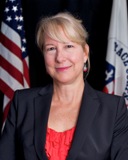Carrie Hessler-Radelet Talks Turkey & Technology At Senior Staff Conference
Carrie Hessler-Radelet (Western Samoa 1981-83), Acting Director of the Peace Corps, on the 5th and 6th of February, held the first Senior Staff Meeting of this new Administration. Aaron Williams (Dominican Republic 1967-70) did not hold any such meetings in his tenure (August 24, 2009 – September 17, 2012) as Director.
Fifty plus Peace Corps ‘Directors’ met for two days in Eastern Maryland to chart the future of the agency. They went down to the shore in freezing winter weather because the hotel rates were cheap. As we know, the Peace Corps loves cheap!
At the meeting Carrie Hessler-Radelet evoked Sargent Shriver’s credo that the Peace Corps was a “bold experiment” and told her senior staff, “the time has come for us to recapture that sense of purpose and idealism, the energy, the innovation…the passion.”
Since become Acting Director in 2013, Carrie has made many major changes in politics and procedures of the agency, doing so, she said, to fully prepare the Peace Corps for the 21st century with a sense of ‘purpose, passion, idealism and hope.’ “We will be bold again,” she declared to the Senior Staff.
Hessler-Radelet is basing her new planning, she says, on the realities of the world. “As the world has advanced and become more sophisticated and connected through technology; and as new problems have arisen and old problems have revealed their complexity and intractability, the Peace Corps needs to become more strategic in how and where it uses its resources.”
Over the past 4 years the Peace Corps–under Carrie’s “acting director’ authority–has undergone extensive reforms to modernize its operation. According to her at the Maryland Senior Staff meeting, she has “just begun.”
The key for Carrie is what she’s calling, “connectivity,” using new technology to update the agency, from the PCVs in the field to HQ operations in D.C. “Connectivity is what the Peace Corps is all about,” summed up Carrie.
Carrie is also basing her thinking on what all PCVs know. Volunteers are the most connected to the local communities in the developing world. PCVs are at ‘ground zero’ when it comes to foreign aid as they are, more than any other foreign-assistance, part of the villages and towns where they live and work.
To take advantage of where Volunteers live and work Washington will ‘reconfigure’ decision making for the whole agency and, as she told the Senior Staff, “will devolve decision-making down as close as they can to the place where the decision is implemented, beginning with recruitment, and used new forms of social media to reach a wider audience of potential Volunteers.”
The process of volunteering for the Peace Corps has almost always been onerous. We all know that. It is easier to become a member of a secret society than to get accepted for Training.
Recruitment, however, is just one of the major changes for the agency. Carrie went onto say that the Peace Corps has already improved support for PCVs, ticking off a number of new initiates. “Our support for Volunteers who have become a victim of crime; our new medevac support team, our quality assurance council; our new evidence-based approach to counseling, are already in place.”
The Peace Corps is also forming new partnerships with universities, NGOs, governments and donors. “The Peace Corps is at the table with development and citizen diplomacy players; this is good for the Volunteers and good for the Peace Corps.”
At the end of her prepared remarks, Carrie put herself on the line, telling the Senior Staff, “I want to take calculated, planned risks, for the betterment of this agency. I’m prepared to make mistakes and learn from them. I want to create an environment where people are not afraid to think big, and not afraid to fail, as long as we can all learn from our mistakes.”
This is Carrie Hessler-Radelet’s blueprint for 2014 and beyond. Her challenge is to herself and the agency. We wish her well because her success will make a positive difference for the Peace Corps. And if she screws up, she said, we have to tell her. Okay, Carrie, we will. And if Sarge was still with us, he’d add, “T’rffic! Let’s do it!”
I welcome so much the dedicated efforts of the Peace Corps Director to continue to bring resources to the grassroots communities. I wish Carrie well. As a health education volunteer fifty years ago, the problems we faced were a lack of resources; a lack of an infrastructure; a lack of technical support from Peace Corps; and, our own lack of training. The collaboration with Universities, NGOs, and multinational corporations will help to provide these much needed essential resources. That is “t’riffoc!.”
There is a possible flip side to these partnerships. Instead of sending trained “manpower” overseas, Peace Corps could be sending untrained students overseas to get trained. Volunteers could be used as unpaid interns for NGOs and multinationals.
Universities and other institutions may not be receptive to the information that Volunteers learn from respecting the life experience of the host country people with whom they work.
Correction: “T’rffic!